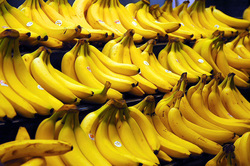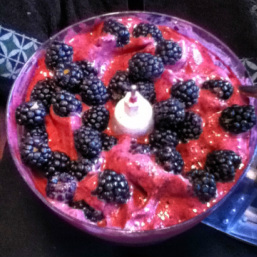Food for Thought: Bananas!
 Cavendish Bananas
Cavendish Bananas One of the most popular, top selling produce items at every grocery store is the banana! This tropical, yellow curved fruit is a staple item in most diets due to its immaculate nutritional profile and sweet, creamy taste!
Bananas are nutritional powerhouses, containing every essential nutrient required for human health (except vitamin D). A single medium banana contains 105 calories, 1.3 grams of protein, 27.0 grams of carbohydrates, 3.1 grams of fiber, and 0.4 grams of fat. Packed within that same banana is a whopping 422 mg of potassium, B complex vitamins, vitamin A, vitamin C, vitamin E, vitamin K, calcium, copper, iron, magnesium, manganese, phosphorus, selenium, sodium, zinc, omega-3 fatty acids, omega-6 fatty acids, and all essential amino acids. Bananas are also an excellent source of soluble fiber and prebiotics, easing digestion and providing nourishment to the probiotic bacteria of the colon. When combined with a low fat, plant-based diet, regular banana consumption can contribute to weight management (fat loss), electrolyte balance, improved digestion, protection against chronic disease (heart disease, diabetes, cancer), blood sugar regulation, increased energy levels, and improved immune function.
Bananas thrive in tropical locations, and can be found growing in areas such as Central America, the Caribbean, Africa, and Southeast Asia. Several varieties of bananas exist including the cavendish (most popular), red banana, lady finger, and plantain.
Bananas are nutritional powerhouses, containing every essential nutrient required for human health (except vitamin D). A single medium banana contains 105 calories, 1.3 grams of protein, 27.0 grams of carbohydrates, 3.1 grams of fiber, and 0.4 grams of fat. Packed within that same banana is a whopping 422 mg of potassium, B complex vitamins, vitamin A, vitamin C, vitamin E, vitamin K, calcium, copper, iron, magnesium, manganese, phosphorus, selenium, sodium, zinc, omega-3 fatty acids, omega-6 fatty acids, and all essential amino acids. Bananas are also an excellent source of soluble fiber and prebiotics, easing digestion and providing nourishment to the probiotic bacteria of the colon. When combined with a low fat, plant-based diet, regular banana consumption can contribute to weight management (fat loss), electrolyte balance, improved digestion, protection against chronic disease (heart disease, diabetes, cancer), blood sugar regulation, increased energy levels, and improved immune function.
Bananas thrive in tropical locations, and can be found growing in areas such as Central America, the Caribbean, Africa, and Southeast Asia. Several varieties of bananas exist including the cavendish (most popular), red banana, lady finger, and plantain.
 Eat Ripe Bananas!
Eat Ripe Bananas! When selecting bananas, choose ones that are free of any blemishes, bruises, or mold. Most bananas are going to be unripe at the store and will need time to ripen prior to consumption. Unripe bananas are mostly starch, lacking both the nutritional and digestive benefits aid truly ripe bananas. Ripe (cavendish) bananas are uniformly yellow with brown spots, and tear easily from the stem. The more spots a ripe banana contains, the more TNF-alpha (a tumor-suppressing compound) that banana will contain! Unripe bananas can be stored in a plastic or brown paper bag, closet, or pantry to increase ripening time. Typically it takes about 7-10 days for store bought green/yellow bananas to completely ripen.
Once your bananas are ripe, they are perfect for eating or freezing for later use. For freezing, unpeel banans, break into quarters and place in a plastic baggie or container. Bananas make great bases for smoothies, milk (banana/s blended with water), and other desserts including pies, pudding, cakes, muffins, ice cream, and fruit salads. Mashed banana also makes an excellent food choice for infants, toddlers, or those with compromised digestion.
Many on a low fat, plant-based diet make bananas a staple food due to their accessibility and low cost. A great tip for success is to get a 40 lb. box (standard shipping size) of bananas each week. This will ensure that you will always have ripe bananas available and ready to eat! Call ahead to see if your grocer offers wholesale prices on bulk banana buys :)
Eat bananas for vitality, health, and longevity!
Victoria
Once your bananas are ripe, they are perfect for eating or freezing for later use. For freezing, unpeel banans, break into quarters and place in a plastic baggie or container. Bananas make great bases for smoothies, milk (banana/s blended with water), and other desserts including pies, pudding, cakes, muffins, ice cream, and fruit salads. Mashed banana also makes an excellent food choice for infants, toddlers, or those with compromised digestion.
Many on a low fat, plant-based diet make bananas a staple food due to their accessibility and low cost. A great tip for success is to get a 40 lb. box (standard shipping size) of bananas each week. This will ensure that you will always have ripe bananas available and ready to eat! Call ahead to see if your grocer offers wholesale prices on bulk banana buys :)
Eat bananas for vitality, health, and longevity!
Victoria
Recipe: Soft Serve Berry Banana Ice Cream

Ingredients:
3 or more frozen bananas
1/2 cup water (use more if needed)
1 cup frozen berries (optional)
fresh berries (topping, optional)
Food Processor or High Speed Blender
Directions:
Place frozen bananas in Food Processor or High Speed Blender. Add water and blend until smooth and creamy (usually takes about 5 minutes). Blend in frozen berries if desired. Once smooth and creamy (no chunks), top with fresh berries. Enjoy!
3 or more frozen bananas
1/2 cup water (use more if needed)
1 cup frozen berries (optional)
fresh berries (topping, optional)
Food Processor or High Speed Blender
Directions:
Place frozen bananas in Food Processor or High Speed Blender. Add water and blend until smooth and creamy (usually takes about 5 minutes). Blend in frozen berries if desired. Once smooth and creamy (no chunks), top with fresh berries. Enjoy!
 RSS Feed
RSS Feed
